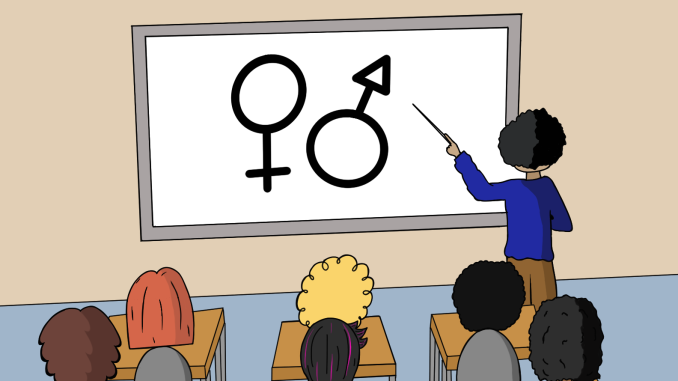
On Oct. 22, President Joe Biden released his national strategy on gender equity and equality. The goal of the equity strategy is to promote the equity of all people, including women and girls, according to the White House’s Fact Sheet.
While the Fact Sheet goes through many aspects that are crucial for women to succeed, it does not mention sex education in schools.
Sex education is essential for students as it provides a forum for taking on issues relating to gender equity, sexual violence prevention and shame surrounding sexual health and reproduction, according to the Sexuality Information and Education Council of the United States.
Temple must establish a bi-monthly sex-ed program that thoroughly explains what healthy relationships and consent look like for new Temple students who may not have gotten this information at their previous schools.
When focusing on relationships, sex education can give students an understanding of how to interact and care for others, which enhances wellbeing and paves the way for healthy relationships in the future. Those who do not receive this type of education may not know what healthy relationships or consent look like.
Many states, like Pennsylvania, do not require sex education in schools. Schools that do provide sex education are required to emphasize abstinence, according to SIECUS.
Abstinence-based sex education teaches that not having sex is the only morally acceptable and effective way to prevent pregnancy and sexually transmitted infections, according to the Kaiser Family Foundation.
This year, new Temple students participated in “Building a Safer Nest,” a sexual assault prevention course. Students who did not complete the courses had a hold on their transcripts placed on their accounts, which prohibits viewing or sending academic transcripts.
“Building a Safer Nest” was basic, said Crystal Wolfe, a freshman finance major. It had slides about consent, but students were not guided by an instructor and completed the program on their own.
“It was all done yourself, it wasn’t guided or anything,” Wolfe said. “That was kind of weird but I mean, it was easy.”
Wolfe felt the the online course was easy because it was on the same level of quality as the sex education at her high school, she said.
Although it’s good that Temple is teaching consent to new students, the university must have instructors connecting with students about these topics and having meaningful conversations so that the courses emphasize human connection in relationships.
Sessions about sex education should not be once a year, but ideally, at least twice a year, said Giacinta Talarico, a social work professor.
“It’s important that this is interwoven throughout their experience, whether it’s in the classroom or at a different number of informational sessions throughout their time,” Talarico said.
Regular exposure to sex education throughout a student’s development normalizes conversations about sexuality and health, according to the Shanker Institute, a nonprofit organization whose goal is to be a voice for working people.
Temple offers a Human Sexuality course, which addresses the dynamic complexity of physical, psychological, relational and cultural aspects of sexuality, but it does not cover consent, according to the Human Behavior bulletin.
However, this class is a one semester course, and Temple should provide more frequent programs about consent and healthy relationships.
Many students, like Madeline Gallagher, a sophomore political science major, went to a Catholic high school and received abstinence-based sex education.
“I didn’t know much beyond what I read on the internet,” Gallagher said. “When you have to rely on the internet alone to get your knowledge, you’re kind of misinformed.”
Much of the online information about sexual health is either not age appropriate for students or is medically inaccurate, according to Planned Parenthood.
Lack of state-mandated sex education makes the topic confusing for professors to navigate too, Talarico said.
“Students are actually much more willing to have these conversations than faculty are because we haven’t been given a clear mandate about what is and isn’t appropriate,” Talarico said.
Temple’s sex education programs cannot be one-and-done. They must be bi-monthly programs, discussing the importance of consent and what healthy relationships should look like.



Be the first to comment